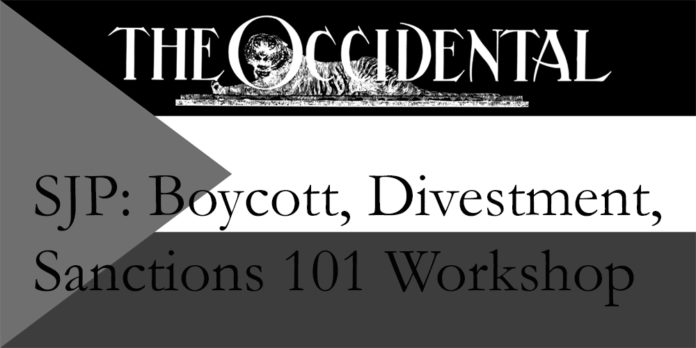Students for Justice in Palestine (SJP) hosted a Boycott, Divestment and Sanctions (BDS) workshop in Fowler Hall March 7. Two members of SJP’s executive board* led the workshop. BDS is modeled after the South African anti-apartheid movement, which employed similar tactics of resistance, according to the SJP e-board members. During the workshop, they said the movement centers around the attainment of recognition for Palestinians’ human rights. The workshop itself provided information on a wide range of topics, including the origins of the BDS movement, its connection to South Africa’s anti-apartheid movement, the movement’s goals, different examples of boycotts, the United States’ involvement in Israel and how to engage in a discussion about BDS. One of the SJP e-board members described the topic of BDS as one that is particularly relevant to Occidental.
“I spent ten weeks researching, and I didn’t get an awful lot because Oxy’s investment policy is not particularly transparent,” the SJP member said. “That was where I got a lot of my knowledge on Oxy’s investments, and I also did archival research into the South Africa divestment campaign at Oxy.”
The SJP e-board member said they hope attendees will make special note of the parallels made between South African apartheid laws and current Israeli laws. They said students have the power to track how Occidental is investing its money, and should remain informed so they can take appropriate actions.
For example, the workshop mentioned how the Marketplace used to serve Sabra Hummus, a brand that is owned by the Strauss Group. The Strauss Group has faced pressure from BDS activists due to their support of the Golani Brigade of the Israeli Defense Force. According to Amy Andrews Muñoz, associate vice president of Hospitality Services, former Associated Students of Occidental College (ASOC) President Theo Savini ’16 contacted her March 2016 about Sabra Hummus’ affiliation with the Strauss Group.
“We replaced the Sabras almost immediately,” Muñoz said via email. “It was a pretty smooth process and demonstrates the kind of decision making that goes on behind the scenes quite regularly.”
Amelia Ashley (senior) attended the BDS workshop and said that she hoped to learn more about specific actions she as an individual can take in order to participate in the boycott movement.
“I wanted to get an idea of the overall plan, as well as the specifics of how I can do my part,” Ashley said. “I wanted to get more information on what specifically I should be boycotting and what the next step would be once we divest from Israeli products and how we plan to move forward — and by ‘we,’ I mean the greater population.”
One of the SJP e-board members said they believe that the dialogue regarding BDS, and the Israeli-Palestinian conflict as a whole, needs to be a wider discussion on campus.
“We try to make sure that each of these events is a conversation, is a discussion, so it’s about getting pushback so we can discuss those myths,” they said. “If people want to be arguing with us then please do, so we can start working our way through some of the myths and some of the truths.”
Another member of SJP’s e-board said that the increased programming was a product of gauging student interest and participation in SJP and extensive planning during the fall semester.
“Coming into the semester — due to the fact that so many people were coming to our events and expressing interest in SJP as an organization — we wanted to make the meetings regular, every week. We specifically wanted to do events with other organizations because we want to acknowledge that justice is not about just one issue, and that all issues are connected,” the e-board member said.
That e-board member also spoke about the benefits of co-sponsoring events. Earlier in the semester, SJP hosted the “Pinkwashing Exposed” film screening, which was sponsored by the Sexuality and Gender Acceptance (SAGA) club, and the “Black and Palestinian Liberation” event, co-sponsored by the Black Student Alliance (BSA).
“We realized that co-sponsoring brings a wider audience into SJP spaces, and it kind of allows for more people to get educated and engage with us as an organization,” they said.
That e-board member emphasized SJP’s effort to reach out to people of all knowledge levels of issues within the Israeli-Palestinian conflict. The BDS workshop was marketed as a ‘101’ type of event, meant to attract people who may not hold a deep knowledge of the issue. All of SJP’s general meetings are open to the Occidental’s campus community, and one e-board member encouraged everyone to engage with the organization.
“We as SJP work for the liberation of all people. It’s not specifically for Palestinian people — although that is what our events focus on and that’s what we specialize in — we want queer justice, we want justice for black liberation, we want to eradicate anti-Semitism,” an e-board member said. “One of the biggest pillars of SJP is definitely solidarity: the fact that all liberation is tied together and we have to work together in order to prevail.”
*One of the e-board members is a former photographer for The Occidental.
This article was updated Aug. 31, 2021 to anonymize information about SJP members.
![]()




































